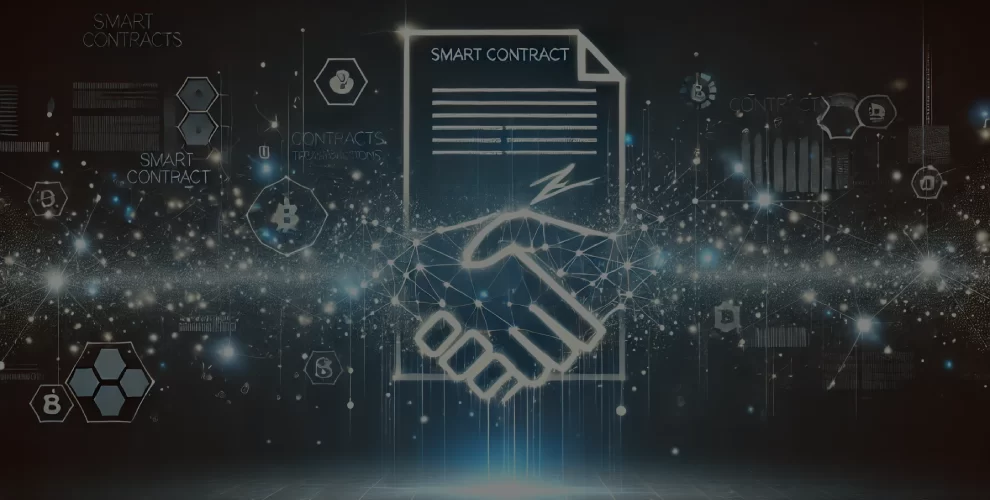
How Smart Contracts are Revolutionizing Business Transactions
Table of Contents
Introduction
Welcome to WikiGlitz! As technology advances, smart contracts are emerging as a game-changer in the business world.
These self-executing contracts are transforming how we conduct transactions, offering unprecedented efficiency, security, and transparency.
In this guide, we’ll delve into what smart contracts are, how they work, and their transformative impact on business transactions and legal agreements.
Key Takeaways
- Efficiency and Automation: Smart contracts streamline and automate business processes, reducing the need for intermediaries and cutting costs.
- Enhanced Security: The immutable and transparent nature of blockchain technology ensures secure and trustworthy transactions.
- Widespread Applications: From real estate to finance, smart contracts are revolutionizing various industries by simplifying and securing transactions.
Understanding Smart Contracts
What are Smart Contracts?
Smart contracts are stored and executed on a blockchain, ensuring that they are immutable and transparent.
When predefined conditions are met, the contract automatically executes the agreed-upon actions.
How Do Smart Contracts Work?
- Deployment: Smart contracts are created using programming languages like Solidity and deployed on blockchain networks such as Ethereum.
- Execution: The contract waits for the predefined conditions to be met. Once triggered, it automatically performs the specified actions.
- Verification: The blockchain network validates and records the execution, ensuring transparency and security.
- Completion: The results are recorded on the blockchain, providing a tamper-proof record of the transaction.
Benefits of Smart Contracts
Efficiency and Cost-Effectiveness
Smart contracts eliminate the need for intermediaries such as lawyers and brokers, reducing transaction costs and speeding up processes.
For example, real estate transactions that typically involve multiple parties and extensive paperwork can be streamlined, significantly cutting down on time and costs.
- Reduced Intermediaries: By automating processes that traditionally required intermediaries, smart contracts save both time and money. This is particularly beneficial in industries like real estate, where transactions can be complex and involve multiple parties.
- Faster Transactions: Smart contracts execute transactions automatically when conditions are met, reducing delays caused by manual processing.
Transparency and Trust
Operating on a decentralized blockchain, smart contracts provide a transparent and auditable record of all transactions.
This transparency fosters trust among parties, as all participants have access to the same information and can verify the contract’s execution in real-time.
- Immutable Records: This immutability enhances trust and reduces the potential for disputes.
- Real-Time Auditability: Blockchain’s decentralized nature allows for real-time auditing, ensuring that all transactions are transparent and traceable.
Security
The cryptographic nature of blockchain technology ensures that smart contracts are secure and tamper-proof.
- Cryptographic Security: Transactions are secured using cryptographic techniques, making them highly resistant to hacking and fraud.
- Decentralization: The decentralized nature of blockchain ensures that no single point of failure exists, further enhancing security.
Applications of Smart Contracts in Business
Real Estate
Streamlining Property Transactions:
Smart contracts automate various aspects of property transactions, including title transfers and escrow services.
This reduces paperwork and eliminates intermediaries, making the process faster and more cost-effective.
Enhancing Transparency and Trust:
By providing a decentralized ledger of transactions, smart contracts ensure all parties have access to the same information, reducing the risk of disputes and fraud.
Facilitating Fractional Ownership:
Smart contracts enable the division of property into smaller units represented as digital tokens, allowing investors to buy and sell fractional shares without intermediaries.
Finance
Automating Financial Agreements:
Smart contracts can automate complex financial agreements, such as loans and insurance policies, by executing transactions automatically when predefined conditions are met.
Decentralized Finance (DeFi):
DeFi platforms leverage smart contracts to provide financial services without traditional intermediaries, offering greater accessibility and lower costs.
Tokenization of Assets:
Smart contracts enable the tokenization of assets, such as company shares, making it easier to raise capital and providing greater liquidity.
Supply Chain Management
Enhancing Traceability:
Smart contracts provide an immutable record of each step in the supply chain, improving transparency and accountability.
Automating Processes:
Contracts can automatically trigger actions such as payments and deliveries when specific conditions are met, reducing delays and errors.
Legal Agreements
Streamlining Legal Processes:
Smart contracts can automate routine legal processes, such as contract execution and compliance checks, reducing the workload for legal professionals.
Ensuring Compliance:
By automatically enforcing the terms of an agreement, smart contracts help ensure compliance and reduce the risk of disputes.
Future of Smart Contracts
Integration with Emerging Technologies
Smart contracts can be integrated with other emerging technologies like the Internet of Things (IoT) and artificial intelligence (AI) to create more advanced and efficient systems.
For example, IoT devices can trigger smart contracts automatically, streamlining processes in industries such as logistics and manufacturing.
- IoT Integration: Smart contracts can interact with IoT devices to automate and secure various processes, such as supply chain management and automated maintenance.
- AI and Big Data: Integrating AI and big data with smart contracts can enhance decision-making and predictive analytics, leading to more efficient and effective business operations.
Legal and Regulatory Considerations
As smart contracts become more prevalent, legal and regulatory frameworks will need to evolve to address issues such as jurisdiction, dispute resolution, and compliance.
Collaboration between technologists and legal experts will be crucial to ensure the smooth integration of smart contracts into existing systems.
- Regulatory Adaptation: Governments and regulatory bodies will need to update legal frameworks to accommodate smart contracts and address potential challenges.
- Dispute Resolution: Mechanisms for resolving disputes involving smart contracts will need to be developed, ensuring that parties have clear avenues for addressing grievances.
Practical Considerations for Implementing Smart Contracts
Choosing the Right Blockchain Platform
Selecting the appropriate blockchain platform is critical for the successful implementation of smart contracts. Factors to consider include the platform’s security, scalability, and community support.
- Ethereum: Known for its robust smart contract capabilities, Ethereum is a popular choice for many businesses.
- Hyperledger Fabric: Designed for enterprise use, Hyperledger Fabric offers modular architecture and support for confidential transactions.
Developing and Testing Smart Contracts
Ensuring that smart contracts are well-designed and thoroughly tested is crucial for their success. This involves writing secure code, conducting rigorous testing, and performing regular audits.
- Code Audits: Regular code audits by experienced blockchain developers can help identify and fix vulnerabilities, ensuring the security and reliability of smart contracts.
- Test Environments: Utilizing test environments can help simulate real-world conditions and identify potential issues before deploying smart contracts on the main network.
Conclusion
Smart Contracts are revolutionizing business transactions by offering unparalleled efficiency, security, and transparency.
From automating financial agreements to streamlining real estate transactions, their impact is profound and far-reaching.
As the technology continues to evolve, smart contracts will play an increasingly important role in shaping the future of business.
Stay tuned with WikiGlitz for more insights and updates on blockchain and other groundbreaking technologies!
FAQs
What is a smart contract?
A smart contract is a self-executing contract with the terms of the agreement directly written into code, stored, and executed on a blockchain.
How do smart contracts enhance security?
Smart contracts are immutable and tamper-proof, ensuring that once deployed, they cannot be altered, reducing the risk of fraud and unauthorized changes.
What are the benefits of using smart contracts in real estate?
Smart contracts streamline property transactions, enhance transparency and trust, facilitate fractional ownership, and reduce costs by eliminating intermediaries.
Can smart contracts be used in finance?
Yes, smart contracts can automate financial agreements, enable decentralized finance (DeFi) services, and facilitate the tokenization of assets, improving accessibility and reducing costs.
What is the future of smart contracts?
The future of smart contracts includes integration with emerging technologies like IoT and AI, evolving legal and regulatory frameworks, and expanding applications across various industries.
Want to keep up with our blog?
Our most valuable tips right inside your inbox, once per month.
Error: Contact form not found.
WikiGlitz Team
Welcome to WikiGlitz, your ultimate destination for tech insights and innovation. Our expert team is dedicated to delivering free resources and professional advice on various technology topics, including Artificial Intelligence, Cyber Security, Cloud Computing, and more. We strive to empower our readers with up-to-date information and practical guidance, ensuring you stay ahead in the rapidly evolving tech landscape. At WikiGlitz, we are passionate about making complex technology accessible to everyone. Our team of seasoned experts curates content that is both informative and engaging, helping you understand and leverage the latest tech trends. Whether you're a tech enthusiast or a professional, WikiGlitz is your go-to source for reliable, expert-driven content. Join us on this journey to explore and embrace the future of technology.





